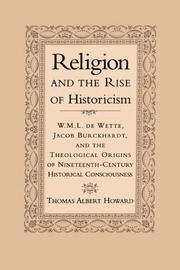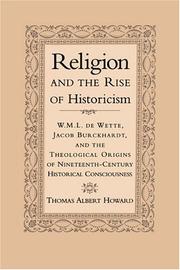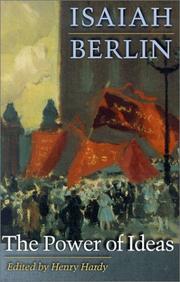| Listing 1 - 6 of 6 |
Sort by
|

ISBN: 9780521026338 Year: 2006 Publisher: Cambridge : Cambridge university press,
Abstract | Keywords | Export | Availability | Bookmark
 Loading...
Loading...Choose an application
- Reference Manager
- EndNote
- RefWorks (Direct export to RefWorks)
This book offers an interpretation of the rise of secular historical thought in nineteenth-century Europe. Instead of characterizing 'historicism' and 'secularization' as fundamental breaks with Europe's religious heritage, they are presented as complex cultural permutations with much continuity; for inherited theological patterns of interpreting experience determined to a large degree the conditions, possibilities and limitations of the forms of historical imagination realizable by nineteenth-century secular intellectuals. This point is made by examining the thought of the German theologian W.M.L. de Wette and that of the Swiss-German historian Jacob Burckhardt. Burckhardt's meeting with de Wette and his subsequent decision to study history over theology are interpreted as revealing moments in nineteenth-century intellectual history. By examining their encounter, its larger historical context, and the thought of both men, the book demonstrates the centrality of theological concerns and forms of knowledge in the emergence of modern, secular historical consciousness.
Bibelkritik --- Historicism. --- Historicism. --- Historieforskning --- Historism --- History --- History --- Historia --- Historia --- Religiösa aspekter --- Kristendom --- Historia. --- Religious aspects --- Christianity. --- Religious aspects --- Christianity. --- Burckhardt, Jacob, --- De Wette, Wilhelm Martin Leberecht,
Book
ISBN: 383945994X 3837659941 Year: 2022 Publisher: Bielefeld transcript Verlag
Abstract | Keywords | Export | Availability | Bookmark
 Loading...
Loading...Choose an application
- Reference Manager
- EndNote
- RefWorks (Direct export to RefWorks)
Oft ist die Benjamin-Forschung dem Ziel verpflichtet, den ›ganzen Benjamin‹ oder dessen ›Denken in nuce‹ zu erheischen. Im Gegensatz dazu erörtert Sven Schöpf das ›ganze Trauerspielbuch‹. Im Zentrum steht hierbei die typographische Gestaltung der 1928 publizierten Erstausgabe von Walter Benjamins legendärem Barockbuch. Um deren hermeneutisches Potential aufzuzeigen, rekonstruiert die Studie schlaglichtartig die Geschichte der Druckschrift sowie die Semantik der Typographie. Zudem wird, vor dem Hintergrund der Buchkunstbewegung und der ›Krise des Historismus‹, ein richtungsweisender Blick auf die Machart literarhistorischer Publikationen geistesgeschichtlicher Provenienz geworfen.
Walter Benjamin; Typographie; Deutsches Trauerspiel; Wissenschaftsgeschichte; Material Turn; Hermeneutik; Druckschrift; Historismus; Literatur; Medien; Kultur; Germanistik; Medienästhetik; Kulturwissenschaft; Literaturwissenschaft; Typography; German Tragedy; History of Science; Hermeneutics; Print; Historism; Literature; Media; Culture; German Literature; Media Aesthetics; Cultural Studies; Literary Studies --- Cultural Studies. --- Culture. --- German Literature. --- German Tragedy. --- Hermeneutics. --- Historism. --- History of Science. --- Literary Studies. --- Literature. --- Material Turn. --- Media Aesthetics. --- Media. --- Print. --- Typography.
Book
ISBN: 3839454069 3837654060 Year: 2020 Publisher: Bielefeld transcript Verlag
Abstract | Keywords | Export | Availability | Bookmark
 Loading...
Loading...Choose an application
- Reference Manager
- EndNote
- RefWorks (Direct export to RefWorks)
Die architekturtheoretische Aufarbeitung des weltweit metastasierenden Phänomens der Themenarchitektur ist durch Aggression und Unverständnis charakterisiert. Der Architekturdiskurs disqualifiziert die plakative, zitathafte Künstlichkeit thematischer Simulationsästhetiken als manipulative »Hyperrealität«. Christian Rabl begreift demgegenüber die rezeptiven Kontingenzeindrücke der sekundaristischen, artifiziellen Themenarchitekturen als (unbeabsichtigte) parodistische »Travestien« und als potenziell befreiend, sofern sie essentialistisch sedimentierte Ordnungsvorstellungen delegitimieren. In seiner anti-essentialistischen Neubeschreibung analysiert er dazu u.a. die simulatorischen Stadtästhetiken von Las Vegas, Orlando und Dubai.
Themenarchitektur; Postmoderne; Las Vegas; Orlando; Dubai; Hyperrealität; Simulationsästhetik; Richard Rorty; Neopragmatismus; Judith Butler; Queer Space; Historismus; Coney Island; Dialektik; Disneyland; Architektur; Kultur; Kunst; Kulturtheorie; Kulturphilosophie; Theme Architecture; Postmodernism; Hyperreality; Simulation Aesthetics; Neopragmatism; Historism; Dialectics; Architecture; Culture; Art; Cultural Theory; Philosophy of Culture --- Architecture. --- Art. --- Coney Island. --- Cultural Theory. --- Culture. --- Dialectics. --- Dubai. --- Historism. --- Hyperreality. --- Judith Butler. --- Las Vegas. --- Neopragmatism. --- Orlando. --- Philosophy of Culture. --- Postmodernism. --- Queer Space. --- Richard Rorty. --- Simulation Aesthetics.
Book
ISBN: 3839452732 9783839452738 3837652734 Year: 2020 Publisher: Bielefeld transcript Verlag
Abstract | Keywords | Export | Availability | Bookmark
 Loading...
Loading...Choose an application
- Reference Manager
- EndNote
- RefWorks (Direct export to RefWorks)
Eine Architekturästhetik des Inauthentischen richtet sich gegen jenen Authentizitätsbegriff, der in der Architekturtheorie und -publizistik als Zentralkategorie fungiert, um künstlerische Autorschaft, bauliche Materialität und unverfälschten Traditionsbezug zu beglaubigen und zu prämieren. Mit der Artikulation der Qualitäten architektonischer Inauthentizitätsphänomene, wie sie die stilimitierende Baukunst des Historismus und deklarativ künstliche Themenarchitekturen - etwa in den Stadtästhetiken von Budapest, Tiflis, Baku, Wiesbaden, Atlantic City und Doha - ausbilden, will Christian Rabl mit seinen Architekturen des Inauthentischen die architekturtheoretischen Authentizitätskategorien deplausibilisieren.
Architekturtheorie; Authentizität; Historismus; Themenarchitektur; Stadt; Stilimitation; Denkmalpflege; Tradition; Klassizismus; Orientalismus; Autorschaft; Budapest; Tiflis; Baku; Wiesbaden; Atlantic City; Doha; Architektur; Kulturgeschichte; Kulturphilosophie; Architectural Theory; Authenticity; Historism; Theme Architecture; City; Heritage Conservation; Classicism; Orientalism; Authorship; Architecture; Cultural History; Philosophy of Culture --- Architecture. --- Atlantic City. --- Authenticity. --- Authorship. --- Baku. --- Budapest. --- City. --- Classicism. --- Cultural History. --- Doha. --- Heritage Conservation. --- Historism. --- Orientalism. --- Philosophy of Culture. --- Stilimitation. --- Theme Architecture. --- Tiflis. --- Tradition. --- Wiesbaden.

ISBN: 0521650224 0521026334 0511528868 9780521650229 9780511528866 9780521026338 Year: 2000 Publisher: Cambridge Cambridge University Press
Abstract | Keywords | Export | Availability | Bookmark
 Loading...
Loading...Choose an application
- Reference Manager
- EndNote
- RefWorks (Direct export to RefWorks)
This book offers an interpretation of the rise of secular historical thought in nineteenth-century Europe. Instead of characterizing 'historicism' and 'secularization' as fundamental breaks with Europe's religious heritage, they are presented as complex cultural permutations with much continuity; for inherited theological patterns of interpreting experience determined to a large degree the conditions, possibilities and limitations of the forms of historical imagination realizable by nineteenth-century secular intellectuals. This point is made by examining the thought of the German theologian W. M. L. de Wette and that of the Swiss-German historian Jacob Burckhardt. Burckhardt's meeting with de Wette and his subsequent decision to study history over theology are interpreted as revealing moments in nineteenth-century intellectual history. By examining their encounter, its larger historical context, and the thought of both men, the book demonstrates the centrality of theological concerns and forms of knowledge in the emergence of modern, secular historical consciousness.
Historicism. --- History --- Historicisme --- Histoire --- Religious aspects --- Christianity --- Philosophy --- Aspect religieux --- Christianisme --- Philosophie --- De Wette, Wilhelm Martin Leberecht, --- Burckhardt, Jacob, --- Christianity. --- 17.031.13 --- 930.11 "19" --- Historicism --- -Annals --- Auxiliary sciences of history --- Ethisch relativisme. Historicisme. Historisme. Relativisme --- Filosofie van de geschiedenis:--20ste eeuw --- -Christianity --- Burckhardt, Jacob --- De Wette, Wilhelm Martin Leberecht --- Burkhardt, Jacob --- -Ethisch relativisme. Historicisme. Historisme. Relativisme --- 930.11 "19" Filosofie van de geschiedenis:--20ste eeuw --- 17.031.13 Ethisch relativisme. Historicisme. Historisme. Relativisme --- -17.031.13 Ethisch relativisme. Historicisme. Historisme. Relativisme --- Annals --- Religious aspects&delete& --- Wette, Wilhelm Martin Leberecht de, --- De Wette, W. M. L. --- De Wette, Gulielmus Martin Leberecht, --- Burckhardt, Jakob --- Burckhardt, Carl Jacob Christoph --- History (Theology) --- Arts and Humanities --- History - Religious aspects - Christianity. --- Bibelkritik --- Historieforskning --- Historism --- Historia --- Religiösa aspekter --- Kristendom --- Historia.

ISBN: 0691092761 069105018X 1400848849 069115760X 1299987524 Year: 2002 Publisher: Princeton Princeton University Press
Abstract | Keywords | Export | Availability | Bookmark
 Loading...
Loading...Choose an application
- Reference Manager
- EndNote
- RefWorks (Direct export to RefWorks)
The essays collected in this new volume reveal Isaiah Berlin at his most lucid and accessible. He was constitutionally incapable of writing with the opacity of the specialist, but these shorter, more introductory pieces provide the perfect starting-point for the reader new to his work. Those who are already familiar with his writing will also be grateful for this further addition to his collected essays. The connecting theme of these essays, as in the case of earlier volumes, is the crucial social and political role--past, present and future--of ideas, and of their progenitors. A rich variety of subject-matters is represented--from philosophy to education, from Russia to Israel, from Marxism to romanticism--so that the truth of Heine's warning is exemplified on a broad front. It is a warning that Berlin often referred to, and provides an answer to those who ask, as from time to time they do, why intellectual history matters. Among the contributions are "My Intellectual Path," Berlin's last essay, a retrospective autobiographical survey of his main preoccupations; and "Jewish Slavery and Emancipation," the classic statement of his Zionist views, long unavailable in print. His other subjects include the Enlightenment, Giambattista Vico, Vissarion Belinsky, Alexander Herzen, G.V. Plekhanov, the Russian intelligentsia, the idea of liberty, political realism, nationalism, and historicism. The book exhibits the full range of his enormously wide expertise and demonstrates the striking and enormously engaging individuality, as well as the power, of his own ideas. "Over a hundred years ago, the German poet Heine warned the French not to underestimate the power of ideas: philosophical concepts nurtured in the stillness of a professor's study could destroy a civilization."--Isaiah Berlin, Two Concepts of Liberty, 1958. This new edition adds a number of previously uncollected pieces, including Berlin's earliest statement of the pluralism of values for which he is famous.
Political philosophy. Social philosophy --- Philosophy. --- Philosophy, Modern. --- Modern philosophy --- Mental philosophy --- Humanities --- Age of Enlightenment. --- Alexander Herzen. --- Analogy. --- Autocracy. --- Awareness. --- Bolsheviks. --- Bourgeoisie. --- Calculation. --- Capitalism. --- Career. --- Cataclysm (Dragonlance). --- Chaim Weizmann. --- Chauvinism. --- Civilisation (TV series). --- Classicism. --- Communism. --- Consciousness. --- Criticism. --- Despotism. --- Disenchantment. --- Eloquence. --- Empirical evidence. --- Empiricism. --- Existentialism. --- Fanaticism. --- For Marx. --- Form of life (philosophy). --- Friedrich Meinecke. --- Good and evil. --- Hatred. --- Historism. --- Humiliation. --- Hypothesis. --- Ideology. --- Individualism. --- Institution. --- Intellectual history. --- Intelligentsia. --- Irony. --- Isaiah Berlin. --- Italians. --- Jerusalem Prize. --- Jews. --- John Stuart Mill. --- Jules Michelet. --- Karl Marx. --- Lecture. --- Literature. --- Marxism. --- Modernity. --- Morality. --- Nationality. --- Natural science. --- Obscurantism. --- Obstacle. --- Of Education. --- Oligarchy. --- Oxford University Press. --- Paternalism. --- Pessimism. --- Phenomenon. --- Philosopher. --- Philosophy of history. --- Political philosophy. --- Politics. --- Populism. --- Positivism. --- Prejudice. --- Publication. --- Rationalism. --- Rationality. --- Reality. --- Reason. --- Relativism. --- Result. --- Rhetoric. --- Romanticism. --- Ruler. --- Russian literature. --- School of thought. --- Science. --- Scientific method. --- Scientist. --- Sensibility. --- Sincerity. --- Skepticism. --- Slavery. --- Sociology. --- Symptom. --- The Philosopher. --- Theory. --- Thought. --- Three Critics of the Enlightenment. --- Treatise. --- War. --- Weizmann. --- Western culture. --- Writing. --- Zionism.
| Listing 1 - 6 of 6 |
Sort by
|

 Search
Search Feedback
Feedback About UniCat
About UniCat  Help
Help News
News